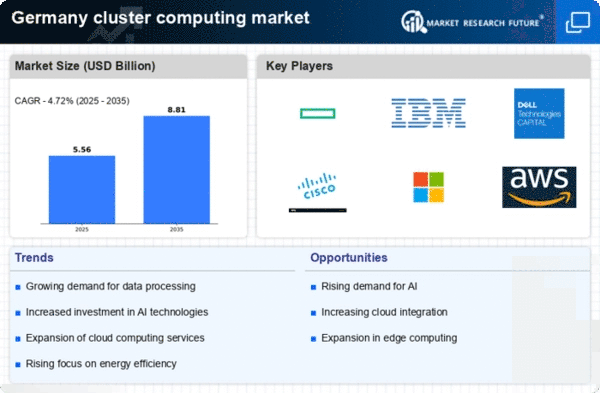Government Initiatives and Funding
The German government is actively promoting the advancement of digital technologies, including cluster computing, through various initiatives and funding programs. These efforts aim to bolster the country's position as a leader in technology and innovation. For instance, the Federal Ministry of Education and Research has allocated substantial funds to support research projects that utilize cluster computing for scientific advancements. This financial backing not only encourages the development of new technologies but also stimulates collaboration between academia and industry. As a result, the cluster computing market is likely to benefit from increased investment and innovation, fostering a conducive environment for growth and expansion.
Advancements in Networking Technologies
Recent advancements in networking technologies are playing a pivotal role in shaping the cluster computing market in Germany. Innovations such as high-speed interconnects and low-latency networking solutions are enhancing the performance and efficiency of cluster computing systems. These developments enable organizations to achieve faster data transfer rates and improved communication between nodes, which is essential for optimizing computational tasks. As businesses increasingly adopt these advanced networking solutions, the cluster computing market is likely to witness a corresponding increase in demand. The integration of cutting-edge networking technologies is expected to enhance the overall capabilities of cluster computing systems, making them more attractive to potential users.
Growing Data Volumes and Analytics Needs
The exponential growth of data generated across industries in Germany is significantly impacting the cluster computing market. Organizations are increasingly recognizing the necessity of advanced analytics to derive actionable insights from vast datasets. This trend is particularly evident in sectors such as retail, telecommunications, and manufacturing, where data-driven decision-making is becoming paramount. As a consequence, the demand for cluster computing solutions that can efficiently process and analyze large volumes of data is on the rise. It is estimated that the data analytics market in Germany will reach €5 billion by 2025, further underscoring the critical role of cluster computing in enabling organizations to harness the power of their data.
Increased Focus on Research and Development
The cluster computing market in Germany is benefiting from a heightened focus on research and development (R&D) across various sectors. Organizations are investing in R&D to explore innovative applications of cluster computing, particularly in fields such as artificial intelligence, machine learning, and big data analytics. This emphasis on R&D is fostering a culture of innovation, leading to the development of new algorithms and methodologies that leverage the power of cluster computing. As a result, the market is likely to see an influx of novel solutions and applications, further driving growth. The commitment to R&D in Germany is expected to solidify the country's position as a hub for technological advancement in the cluster computing market.
Rising Demand for High-Performance Computing
The cluster computing market in Germany is experiencing a notable surge in demand for high-performance computing (HPC) solutions. This trend is driven by the increasing need for complex data analysis and simulations across various sectors, including finance, healthcare, and scientific research. As organizations seek to enhance their computational capabilities, investments in cluster computing infrastructure are projected to grow. According to recent data, the HPC market in Germany is expected to reach approximately €1.5 billion by 2026, reflecting a compound annual growth rate (CAGR) of around 8%. This growth indicates a robust interest in leveraging cluster computing technologies to address computational challenges, thereby propelling the overall cluster computing market forward.
















